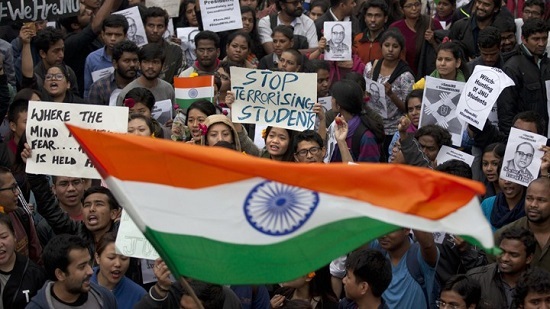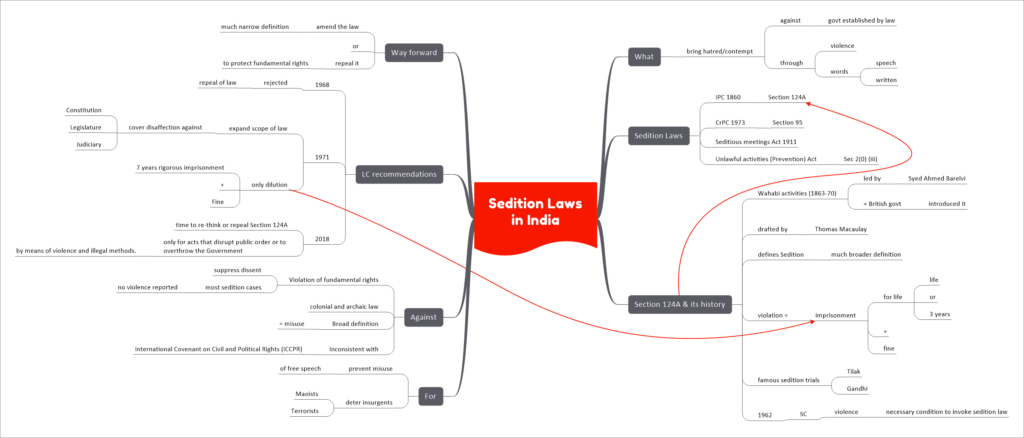Sedition Law in India (IPC Section 124A) – History, Pros, Cons

In News: In a historic development, the Supreme Court has ruled that the 152-year old sedition law under IPC Section 124A should be effectively suspended till the Union Government revisits the provision. The Court urged the Centre and the State governments to stop registering any FIRs under the said provision while it was under re-consideration.
What is Sedition?
- Sedition is legally defined as “the criminal act of revolting against established authority, generally in the form of treason or defamation of a government.”
- In other words, if you are conspiring or plotting to overthrow by violence, force, harm in any way, or more specifically, kill any authority figure in the government, you have committed sedition.
- Sedition not only encompasses an individual’s actions but also any words or writings in print that may incite, encourage or promote the overthrowing of the government. To overthrow means to remove by force.
What are the sedition laws in India?
Sedition laws can be found in the following laws altogether:
- The Indian Penal Code, 1860 (Section 124A),
- The Code of Criminal Procedure, 1973 (Section 95),
- The Seditious Meetings Act, 1911 and,
- The Unlawful Activities (Prevention) Act (Section 2(0) (iii)).
How sedition laws have been misused?
- In 2018, the Delhi Police filed a charge sheet against 10 people, including student leaders in a sedition case for allegedly raising “anti-national slogans” during an event on the Jawaharlal Nehru University (JNU) campus in February 2016.
- In addition to this, as many as 12 Aligarh Muslim University students, including the university’s students’ union chief, were recently booked under sedition charges after a complaint of the alleged assault was filed by an ABVP member.
- In another instance where an Assamese scholar and two others were slapped with sedition charges for remarks made against the proposed citizenship law.
- These fit a disturbing trend of many incidents in recent times where “misguided” people have been termed “anti-national” and have filed charges of sedition.
What is Section 124A of IPC and its history?
- Section 124A was drafted by Thomas Macaulay and was introduced by the British colonial government in the 1870s when it felt the need for a specific law under IPC to deal with increasing Wahabi movement activities between 1863 and 1870, led by Syed Ahmed Barelvi and centred around Patna.
- It mentions that the act of sedition refers to bringing hatred or contempt against the government established by law in India.
- In this case, the punishment may be imprisonment for life and fine, or imprisonment for 3 years and fine.
- It was actually introduced to suppress the freedom struggle prevalent then.
- In the 19th and early 20th centuries, the law was mainly used against Indian political leaders seeking independence from British rule.
- Britishers famously used the clause in three separate, successful trials of Bal Gangadhar Tilak, and also later, in prosecuting Mahatma Gandhi in 1922.
- Mahatma Gandhi, who was charged with sedition, famously said the law was “designed to suppress the liberty of the citizen”.
- In 1962, the Supreme Court imposed restrictions on the use of the law, making incitement to violence a necessary condition.
What are the arguments against Section 124A?
Violation of fundamental rights:
- Centre and the States have invoked the section against activists, detractors, writers and even cartoonists to silence political dissent by accusing them of promoting disaffection = violation of their fundamental right to free speech and expression under Article 19 of the constitution.
- According to the National Crime Records Bureau, 35 cases of sedition were reported in 2016. Several of these cases did not involve violence or incitement to violence.
A colonial law:
- It was introduced by the British to suppress the freedom struggle and its existence at present is not justified.
- Even Britain abolished this law 10 years ago. Then why does India still have this section alive.
Definition:
- Definition of sedition remains too broad = misuse.
- Under the present law, it offers scope to consider the following as seditious.
- Strong criticism against government policies and personalities.
- Slogans voicing disapprobation (condemnation) of leaders.
- Depictions of an unresponsive or insensitive regime.
Inconsistent with ICCPR:
- India ratified the International Covenant on Civil and Political Rights (ICCPR).
- Misuse of sedition law under Section 124A and the arbitrary imposing of charges are inconsistent with the ICCPR.
Inconsistent with SC directive:
- In recent times, the core principle provided by the Supreme Court in this regard has been forgotten.
- It mentions that incitement to violence or the tendency to create public disorder are the main ingredients of the offence.
What are the arguments in favour of Section 124A?
Misuse of free speech: The primary reason behind the continuation of the Sedition Act after independence was to prevent the misuse of free speech (reasonable restriction) that would be aimed at inciting hatred and violence.
Deter insurgents: It would be very dangerous to abolish the section due to the insurgency by Maoists and other rebel groups. These groups openly advocate the overthrow of the state government through armed revolution.
What are the Law Commission’s recommendations?
- In an earlier report in 1968, the Law Commission had rejected the idea of repealing the section.
- Later in 1971, the panel wanted the scope of the section to be expanded.
- It called for covering the Constitution, the legislature and the Judiciary under the ambit of the law, in addition to only ‘government’. Because disaffection against all these institutions should not be tolerated.
- The only dilution the commission wanted was to modify the wide gap between the two jail terms prescribed (either 3 years of life). It called for fixing the maximum sanction at 7 years’ rigorous imprisonment with a fine.
- In August 2018, the Law Commission of India published a consultation paper suggesting that it is time to re-think or repeal Section 124A of the Indian Penal Code that deals with sedition. The Law Commission has recommended invoking 124A to only criminalize acts committed with the aim to disrupt public order or to overthrow the Government by means of violence and illegal methods.
What is the recent SC order?
A bench constituting the Chief Justice of India NV Ramana, Justice Surya Kant, and Justice Hima Kohli held that
- The 152-year old sedition law under IPC Section 124A should be effectively suspended till the Union Government revisits the provision.
- the centre and the State governments to restrain from registering any FIR, continuing any investigation or taking any coercive measures under the said provision while it was under re-consideration.
- If any fresh case is registered under Section 124A of IPC, the affected parties can approach the concerned Courts for proper relief. The Courts are requested to review the reliefs sought, taking into account the present order passed as well as the clear stand taken by the Union of India.
- All pending trials, appeals and proceedings regarding the charge framed under Section 124A of IPC be suspended. Adjudication with respect to other Sections, if any, could proceed if the Courts are of the opinion that no prejudice would be caused to the accused.
- In addition to the above, the Union of India is free to issue the Directive as proposed and placed before us, to the State Governments/Union Territories to prevent any misuse of Section 124A of IPC.
- The above directions may continue till further orders are passed.
The case of the petitioner is that this provision of law dated back to 1898 and is being misused. The Attorney General had also given instances of glaring misuse like cases registered for recital of hanuman chalisa.
The bench passed the order after observing that the Union Government’s stand that the colonial provision requires “re-consideration and re-examination” means that the Government has agreed with the prima facie view expressed by the Court that the “rigours of 124A IPC isn’t in tune with current social milieu and was intended for when the country was under colonial regime”. Therefore, the Court ordered that the Union of India may reconsider the provision.
What is the way forward?
As long as sedition is seen as a reasonable restriction on free speech on the ground of preserving public order, it will be difficult to contain its mischief. Therefore, there are two ways to undo the harm that the sedition provision does to citizens’ fundamental rights:
- It can be amended to include a much narrower definition of what constitutes sedition because ‘Overbroad’ definitions typically cover both harmless and harmful acts.
- The second and best course would be to repeal the section altogether.
Conclusion
Criticism against the government policies and decisions within a reasonable limit that does not incite people to rebel is consistent with freedom of speech and expression. Currently, the section is being slapped against any disagreeing entity, without any fairness. It is this grey area, which needs to be corrected. Only when it amounts to an incitement to violence, such sections should be brought in.
If you like this post, please share your feedback in the comments section below so that we will upload more posts like this.


